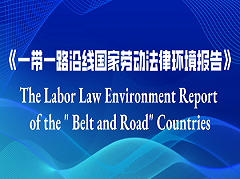本文作者/The Author:
拉里萨·奥尔洛娃
Larissa Orlova
本文译者/The Translator:
郑采薇 Zheng Caiwei
一、前言 Foreword
哈萨克斯坦作为中国永久全面战略伙伴关系,拥有丰富的自然资源和庞大的市场潜力,吸引了众多中国企业的投资与合作。然而,要在哈萨克斯坦顺利开展业务,深入了解当地的劳动法律法规至关重要。本指南旨在为中国企业提供哈萨克斯坦劳动法的基本框架和关键要点,帮助企业规避法律风险,促进合规经营。
As a permanent comprehensive strategic partner of China, Kazakhstan boasts abundant natural resources and vast market potential, attracting significant investment and collaboration from Chinese enterprises. However, to successfully conduct business in Kazakhstan, a thorough understanding of local labor laws and regulations is essential. This guide aims to provide Chinese companies with an overview of the basic framework and key points of Kazakhstan's labor laws, helping businesses avoid legal risks and promote compliant operations.
在《哈萨克斯坦劳动法概览》中,拥有多年实务经验的Larissa Orlova,Verum 律师作为主要作者,系统地讲解了哈萨克斯坦劳动法法律框架和特点,涵盖从劳动关系建立、工作条件、薪酬福利到社会保险等多方面的内容,为用人单位提供了清晰的操作指引。本指南作为《哈萨克斯坦劳动法概览》的译介版本,结合了中国企业在哈萨克斯坦的实际需求,对原书内容进行了精选与梳理,力求简洁明了地呈现哈萨克斯坦劳动法的精髓。我们期待通过本指南的推广,增进中哈两国在劳动法领域的交流与合作,共同推动两国经济的繁荣发展。
In the Kazakhstan Labor Law Overview, Larissa Orlova, a lawyer at Verum with years of practical experience, serves as the main author, systematically explaining the legal framework and characteristics of Kazakhstan's labor law. The guide covers various aspects, including the establishment of labor relations, working conditions, compensation and benefits, and social insurance, providing employers with clear operational guidelines. This guide, as a translated version of Kazakhstan Labor Law Overview, combines the actual needs of Chinese companies in Kazakhstan with a selection and organization of the original book's content, striving to present the essence of Kazakhstan's labor law in a concise and clear manner. We look forward to promoting this guide to enhance exchanges and cooperation between China and Kazakhstan in the field of labor law and jointly promote the prosperous development of the economies of both countries.
(下文为《哈萨克斯坦劳动法概览》节选内容之下半部分,完整版详见《一带一路沿线国家劳动法律环境报告》之哈萨克斯坦篇)
(The following content is excerpted from the Kazakhstan Labor Law Overview - Part B. For the full version, refer to the Kazakhstan Chapter in the Invitation to Contribute to The Labor Law Environment Report of the " Belt and Road" Countries.)
二、外国公司与外籍劳动者 Foreign Companies and Foreign Workers
外国公司的合法机构设立与管辖:外国公司必须在哈萨克斯坦设立合法机构才能开展业务,受哈萨克斯坦劳动法的管辖。
Legal Institution Setup and Jurisdiction for Foreign Companies: Foreign companies must establish a legal institution in Kazakhstan to conduct business, which falls under the jurisdiction of Kazakh labor law.
就业限制与配额制度:哈萨克斯坦通过外国劳动者配额制度对国内劳动力市场实行保护。除欧亚经济联盟成员国的公民等享有平等就业权利的人员外,各公司必须为非哈萨克斯坦劳动者获得工作许可。配额制度每年实施一次,按行业和地区分配,外国公司在获得聘用外国专家的许可之前,必须证明所需专业知识无法在哈萨克斯坦本地获得,并且要按照批准的时间表,逐步用哈萨克斯坦公民取代外国专家。
Employment Restrictions and Quota System: Kazakhstan protects its domestic labor market through a foreign worker quota system. Except for citizens of EAEU member states who enjoy equal employment rights, companies must obtain work permits for non-Kazakhstani workers. The quota system, implemented annually and allocated by sector and region, requires foreign companies to demonstrate that the required professional expertise is unavailable locally before obtaining permits for foreign specialists. They must also replace foreign workers with Kazakhstani citizens over time as per the approved timeline.
非法就业处罚:哈萨克斯坦对非法就业行为的处罚严厉。行政罚款可达月计算指数的 50 至 200 倍,外国公民若被发现未获适当授权工作,可能会被处以行政罚款、驱逐出境、暂时禁止再次进入哈萨克斯坦;涉及非法就业的公司高管可能面临个人责任,包括被取消管理职位的资格;违规公司还会遭遇运营中断及今后难以获得许可证等问题。
Penalties for Illegal Employment: Kazakhstan imposes severe penalties for illegal employment. Administrative fines can reach 50 to 200 times the monthly calculation index. Foreigners found working without proper authorization may face administrative fines, deportation, and a temporary ban on re-entry. Company executives involved in illegal employment may bear personal responsibility, including disqualification from management positions. Non-compliant companies may also experience business disruptions and face difficulties in obtaining licenses in the future.
外籍劳动者就业管理:哈萨克斯坦采用全面的监管框架管理外籍劳工的就业,政府根据劳动力市场需求和经济优先事项,确定外籍劳工的年度配额,并将其分配给各经济部门和地理区域。
Employment Management of Foreign Workers: Kazakhstan adopts a comprehensive regulatory framework to manage the employment of foreign workers. The government determines the annual quota for foreign labor based on labor market needs and economic priorities, allocating it to various economic sectors and geographical regions.
聘用外籍劳动者的用人单位要求:用人单位聘用外籍员工必须以未能招聘本地候选人为前提,需证明所需的技能或专业知识无法在国内获得,还需承诺并实施具体的本地化计划,概述如何在一定时期内将知识和技能从外国专家传授给哈萨克斯坦员工,当局会对这些计划进行审查,并监督其执行情况,外籍劳动者必须具备与拟任职务相称的资历和经验,其学历需得到哈萨克斯坦当局的正式承认或认证。
Requirements for Employers Hiring Foreign Workers: Employers hiring foreign workers must premise that they have failed to recruit local candidates. They need to prove that the required skills or expertise are unavailable domestically. Employers must also commit to and implement specific localization plans, outlining how knowledge and skills will be transferred from foreign experts to Kazakhstani employees over time. Authorities will review and supervise the implementation of these plans. Foreign workers must possess qualifications and experience commensurate with their intended positions, and their academic credentials must be officially recognized or certified by Kazakhstani authorities.
外籍劳动者登记要求与工作许可:计划在哈萨克斯坦长期工作的外国劳动者需要工作签证,工作签证根据相关工作许可签发。主办机构有义务将外国人抵达哈萨克斯坦、终止就业以及变更居住地的情况通知当地移民局。用人单位负责为外籍员工申请工作许可,工作许可证是为指定公司的特定职位签发的,不得在用人单位之间转让,许可证有效期因类别而异,通常为一至三年,续签需继续遵守所有要求,包括遵守本地化承诺。申请过程需要大量文件,审批时间为一至两个月,在有限情况下可办理加急手续但需支付额外费用,部分外籍员工可免除工作许可要求。
Registration Requirements and Work Permits for Foreign Workers: Foreigners planning to work long-term in Kazakhstan require a work visa, which is issued based on a work permit. Host organizations are obligated to report to local immigration authorities any changes regarding a foreigner's arrival, termination of employment, or change of residence in Kazakhstan. Employers are responsible for applying for work permits on behalf of foreign employees. Work permits are issued for specific positions within a designated company and are not transferable between employers. The validity of the permit varies by category, typically lasting one to three years, with renewal contingent on continued compliance with all requirements, including localization commitments. The application process involves numerous documents, with an approval time of one to two months. In limited cases, expedited processing is available for an additional fee. Certain categories of foreign workers may be exempt from work permit requirements.
居留许可:获得工作许可后,用人单位须向哈萨克斯坦移民当局申请临时居留许可,临时居留证取决于有效的工作许可证,为在哈萨克斯坦境内长期居留提供法律依据,申请过程包括提交工作许可证、住宿证明、医疗证明、医疗保险证明、外国人指纹记录等文件,居留证有效期一般与劳动合同期限一致,居住证持有者需向当地政府登记住址并通知住址变更,居留证赋予的权利不仅包括合法居留,还包括享受公共医疗保健、受抚养人教育及国际协议规定社会保障福利等,但不自动赋予家庭成员就业权,家庭成员若希望工作,需单独授权,外国人还需获得个人身份号码和数字签名。
Residence Permits: After obtaining a work permit, employers must apply for a temporary residence permit from Kazakhstani immigration authorities on behalf of the foreign worker. A temporary residence permit, which is contingent on a valid work permit, serves as the legal basis for long-term residence in Kazakhstan. The application process involves submitting documents such as a work permit, proof of accommodation, medical certificate, medical insurance proof, and fingerprint records of the foreigner. The validity of the residence permit generally aligns with the duration of the labor contract. Holders of residence permits must register their address with the local government and notify any changes. While residence permits grant rights such as legal residence, access to public healthcare, education for dependents, and social security benefits as per international agreements, they do not automatically extend employment rights to family members. Family members wishing to work must obtain separate authorization. Foreigners are also required to obtain a personal identification number and a digital signature.
三、集体协商 Collective Bargaining
工会的地位/作用:哈萨克斯坦工会在《工会法》和《劳动法》框架内运作,是保护劳动者权益的重要组织形式。工会可与用人单位和政府就劳动条件、薪酬等问题协商,参与工作场所安全检查和事故调查等。
Status and Role of Trade Unions: Operating within the framework of the Trade Union Law and Labor Law, trade unions in Kazakhstan serve as a crucial means of protecting workers' rights. They engage in negotiations with employers and the government on issues such as working conditions and wages, and participate in workplace safety inspections and accident investigations.
员工代表机构:在无工会情况下,可通过选举产生员工代表机构(ERA),ERA 有权代表员工利益,与用人单位集体谈判等。
Employee Representative Bodies: In the absence of a trade union, an Employee Representative Body (ERA) can be established through elections. The ERA has the authority to represent employees' interests and engage in collective bargaining with employers.
集体协商协议:集体协议是员工代表与用人单位达成的规范劳动关系的书面协议,可涉及薪酬、工时、休假等多方面内容。集体协议须在签订后一个月内提交地区劳动行政部门监督,其内容不得降低劳动者地位。
Collective Bargaining Agreements: A collective agreement is a written accord between employee representatives and employers that regulates labor relations. It may cover various aspects such as wages, working hours, and leave entitlements. The agreement must be submitted to the regional labor administration department for supervision within one month of its conclusion and must not undermine the employees' status.
四、劳动合同解除与劳动纠纷 Termination of Employment Contracts and Labor Disputes
解除理由:哈萨克斯坦劳动法对劳动合同解除理由规定严格,包括双方同意、定期合同到期、劳动者辞职、用人单位提特定理由解除等。用人单位因故解除劳动合同时,需符合如裁员、生产减少、劳动者资格不足等法定情形,并遵循严格程序。
Grounds for Termination: The Labor Code of Kazakhstan sets out strict regulations for the termination of employment contracts. Valid grounds for termination include mutual consent, the expiration of a fixed-term contract, the employee's resignation, and specific grounds initiated by the employer. When an employer terminates a contract for cause, it must comply with statutory scenarios such as redundancy, reduced production, or the employee's inadequate qualifications, and must follow a rigorous procedure.
通知期与遣散费:依解除理由不同,适用不同通知要求和遣散费支付标准。如用人单位因清算、裁员等解除合同,需提前至少30天书面通知劳动者或支付代通知金,且需支付遣散费;劳动者提前提前30天书面通知可解除合同,特定情况下可缩短或无需通知。
Notice Periods and Severance Pay: Depending on the grounds for termination, different notice periods and severance pay requirements apply. For instance, if an employer terminates a contract due to liquidation or redundancy, they must provide at least 30 days' written notice to the employee or pay compensation in lieu of notice, along with severance pay. An employee may terminate their contract by giving at least 30 days' prior written notice, although this period may be shortened or waived in certain circumstances.
终止协议:用人单位可与劳动者签订共同终止协议,一般无严格签订程序要求,但需以书面形式记录,明确终止时间等条款。
Termination Agreements: Employers and employees may enter into a mutual termination agreement, which typically does not follow a strict procedural framework but must be recorded in writing and specify the termination date and other relevant terms.
不当解除索赔:劳动者可因用人单位违反劳动合同或劳动法终止劳动关系而提出不当解除索赔,理由包括解除无事实依据或不符合程序要求。被违法解除的员工可恢复劳动关系、补发工资及获精神损害赔偿。
Unjustified Termination Claims: Employees may file claims for unjustified termination if their employment is ended in violation of the labor contract or labor law. Such claims may arise from terminations lacking factual basis or those that fail to comply with procedural requirements. Wrongfully dismissed employees may be reinstated to their positions, receive back wages, and be awarded compensation for mental distress.
反歧视问题:哈萨克斯坦劳动法明确禁止就业歧视,列举多项不得作为歧视依据的受保护特征,劳动者可通过行政申诉或司法诉讼对歧视行为寻求补救。
Anti-discrimination Provisions: The Labor Code of Kazakhstan explicitly prohibits employment discrimination, enumerating various protected characteristics that cannot serve as a basis for discrimination. Employees who believe they have been subjected to discrimination may seek redress through administrative complaints or judicial proceedings.
个人劳动争议:调解委员会是解决个人劳动争议的主要机制,调解未果可诉诸法院。个人劳动争议诉讼程序有特定的时限,对需要调解委员会初步审理的争议和可直接向法院申请的个人分别规定了不同的期限。
Individual Labor Disputes: The primary mechanism for resolving individual labor disputes is through conciliation commissions. If conciliation efforts are unsuccessful, the dispute may be escalated to a court of law. Specific time limits govern the initiation of legal proceedings for individual labor disputes, with different timelines applicable to disputes requiring prior conciliation and those that may be directly filed in court.
集体劳动争议:遵循循序渐进的解决顺序,包括用人单位或工会处理、和解委员会审查、劳动仲裁等环节,最终由法院解决。和解委员会由双方平等代表组成,劳动仲裁小组由集体劳动争议各方在和解未果后组成,仲裁决定对各方均有约束力。
Collective Labor Disputes: The resolution process for collective labor disputes follows a step-by-step approach, involving initial handling by the employer or trade union, followed by review by a conciliation commission, and if necessary, labor arbitration. Ultimately, the dispute may be adjudicated by a court. The conciliation commission is composed of equal representatives from both parties, while the labor arbitration tribunal is formed by the parties to the collective labor dispute in the event that conciliation fails to reach a resolution. Decisions made by the arbitration tribunal are binding on all parties involved.
替代性争议解决办法:包括调解和劳动保障监督等,调解员可由争议各方协商确定,劳动保障监督提供行政机制监督劳动立法遵守情况。
Alternative Dispute Resolution Methods: These include mediation and labor inspection oversight. Mediators may be appointed through mutual agreement between the disputing parties, and the labor inspection provides an administrative mechanism to ensure compliance with labor legislation.
五、社会保险 Social Insurance
养老保险:哈萨克斯坦实行累积养老金制度,养老金缴款来自劳动者收入,包括强制性养老金缴款和强制性职业养老金缴款等。养老金缴款及其投资收益构成支付养老金的财务基础。
Pension Insurance: Kazakhstan has implemented a funded pension system where pension contributions are derived from employees' income, including mandatory pension contributions and mandatory professional pension contributions. The pension fund and its investment returns form the financial basis for pension payments.
医疗保险:2020 年引入强制性社会医疗保险制度,遵循社会导向等原则,为公民提供基本医疗和更多医疗服务。
Medical Insurance: Since 2020, Kazakhstan has introduced a mandatory social medical insurance system based on the principles of social orientation, providing citizens with basic medical services and a broader range of medical benefits.
生育保险:生育保险纳入社会保障框架,女职工享受产假、陪产假、育儿假等福利,还有一次性国家生育津贴、未工作女性儿童年满一岁半时的每月育儿津贴等具体补助标准和申领条件。
Maternity Insurance: Maternity insurance is integrated into the social security framework, offering female employees benefits such as maternity leave, paternity leave, and childcare leave, along with financial subsidies like a one-off state maternity allowance and monthly childcare allowances for children under one and a half years of age for non-working women.
工伤保险:用人单位须为劳动者购买工伤和职业病保险,发生工伤事故时需进行调查并提供相应赔偿。该系统规定了工伤认定、调查程序及保险合同要求等。
Work Injury Insurance: Employers are required to purchase work injury and occupational disease insurance for employees. In the event of a work-related accident, an investigation must be conducted and corresponding compensation provided. The system outlines the procedures for recognizing work injuries, conducting investigations, and the requirements for insurance contracts.
失业保险:哈萨克斯坦实行强制性社会保险制度,为失业者提供基本经济保护,符合条件的参保者可领取失业保险金。明确了失业保险金的计算方法、领取条件及申请要求等。
Unemployment Insurance: Kazakhstan has established a mandatory social insurance system that provides basic economic protection for unemployed individuals. Qualified insured persons are entitled to unemployment benefits, with clear regulations on the calculation method, eligibility criteria, and application procedures for such benefits.
作者简介/About the Authors
拉里萨·奥尔洛娃 Larissa Orlova
拉里萨·奥尔洛娃担任Verum律师事务所的法律顾问,拥有在哈萨克斯坦顶尖律师事务所积累的超过20年卓越实践经验。她曾就争议性及非争议性事务为多个行业领域提供法律建议。
她的职业生涯涵盖公司律师和专业支持律师的角色,展现出在交易和咨询领域卓越的知识广度和灵活性。拉里萨与维鲁姆律师事务所的公司、税务、劳动、争议和采矿团队无缝合作,为客户提供日常咨询和交易需求的综合解决方案。
在劳动法领域,拉里萨在复杂问题上积累了丰富经验,包括高管解雇、工作场所政策制定、员工福利结构以及劳动纠纷解决。她以全面的方法确保客户获得实用的、以业务为导向的法律指导,这些指导针对哈萨克斯坦不断变化的监管环境进行了定制。
Larissa Orlova serves as Of Counsel at Verum LLP, bringing over 20 years of distinguished practical experience acquired at Kazakhstan's leading law firms. She has advised on both contentious and non-contentious matters across diverse industry sectors.
Her career encompasses roles as a corporate lawyer and professional support lawyer, demonstrating exceptional breadth of knowledge and versatility in transactional and advisory capacities. Larissa collaborates seamlessly with Verum's corporate, tax, employment, disputes and mining teams to deliver integrated solutions for clients' day-to-day advisory and transactional needs.
In employment law, Larissa has developed particular expertise in complex issues including executive terminations, workplace policy development, employee benefits structures, and labour dispute resolution. Her comprehensive approach ensures clients receive practical, business-oriented legal guidance tailored to Kazakhstan's evolving regulatory landscape.
郑采薇 Zheng Caiwei
郑采薇律师执业领域为劳动法和社会保障法。为多家企业提供法律咨询及顾问服务。
郑采薇律师具有法学学科背景,毕业于中南财经政法大学,取得法学硕士学位。
Ms. Zheng specializes in labor law and social security law.She provides legal consultation and advisory services for several enterprises.
Zheng graduated from Zhongnan University of Economics and Law with a Master of Laws degree.





